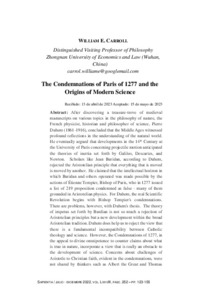Por favor, use este identificador para citar o enlazar este ítem:
https://repositorio.uca.edu.ar/handle/123456789/18064| Título: | The condemnations of Paris of 1277 and the origins of modern science Las condenas de París de 1277 y los orígenes de la ciencia moderna |
Autor: | Carroll, William E. | Palabras clave: | Duhem, Pierre, 1861- 1916; Jaki, Stanley L., 1924-2009; Blumenberg, Hans, 1920-1996; Torrance, Thomas Forsyth, 1913-2007; FISICA ARISTOTELICA; TEORIA DEL IMPETU; NATURALEZA; NADA | Fecha de publicación: | 2022 | Editorial: | Pontificia Universidad Católica Argentina. Facultad de Filosofía y Letras | Cita: | Carroll, W. E. The condemnations of Paris of 1277 and the origins of modern science [en línea]. Sapientia. 2022, 78 (252). Disponible en: https://repositorio.uca.edu.ar/handle/123456789/18064 | Resumen: | Abstract: After discovering a treasure-trove of medieval
manuscripts on various topics in the philosophy of nature, the
French physicist, historian and philosopher of science, Pierre
Duhem (1861-1916), concluded that the Middle Ages witnessed
profound reflections in the understanding of the natural world.
He eventually argued that developments in the 14th Century at
the University of Paris concerning projectile motion anticipated
the theories of inertia set forth by Galileo, Descartes, and
Newton. Scholars like Jean Buridan, according to Duhem,
rejected the Aristotelian principle that everything that is moved
is moved by another. He claimed that the intellectual horizon in
which Buridan and others operated was made possible by the
actions of Étienne Tempier, Bishop of Paris, who in 1277 issued
a list of 219 proposition condemned as false - many of them
grounded in Aristotelian physics. For Duhem, the real Scientific
Revolution begins with Bishop Tempier's condemnations.
There are problems, however, with Duhem's thesis. The theory
of impetus set forth by Burdian is not so much a rejection of
Aristotelian principles but a new development within the broad
Aristotelian tradition. Duhem does help us to reject the view that
there is a fundamental incompatibility between Catholic
theology and science. However, the Condemnations of 1277, in
the appeal to divine omnipotence to counter claims about what
is true in nature, incorporate a view that is really an obstacle to
the development of science. Concerns about challenges of
Aristotle to Christian faith, evident in the condemnations, were
not shared by thinkers such as Albert the Great and Thomas Aquinas. Resumen: Tras descubrir un tesoro de manuscritos medievales sobre diversos temas de la filosofía de la naturaleza, el físico, historiador y filósofo de la ciencia francés Pierre Duhem (1861- 1916) concluyó que la Edad Media fue testigo de profundas reflexiones en la comprensión de lo natural. mundo. Finalmente argumentó que los avances ocurridos en el siglo XIV en la Universidad de París en relación con el movimiento de los proyectiles anticiparon las teorías de la inercia expuestas por Galileo, Descartes y Newton. Eruditos como Jean Buridan, según Duhem, rechazaron el principio aristotélico de que todo lo que se mueve es movido por otro. Afirmó que el horizonte intelectual en el que operaban Buridan y otros fue posible gracias a las acciones de Étienne Tempier, obispo de París, quien en 1277 publicó una lista de 219 proposiciones condenadas como falsas, muchas de ellas basadas en la física aristotélica. Para Duhem, la verdadera revolución científica comienza con las condenas del obispo Tempier. Sin embargo, la tesis de Duhem plantea problemas. La teoría del ímpetu expuesta por Burdian no es tanto un rechazo de los principios aristotélicos sino un nuevo desarrollo dentro de la amplia tradición aristotélica. Duhem nos ayuda a rechazar la opinión de que existe una incompatibilidad fundamental entre la teología católica y la ciencia. Sin embargo, las Condenas de 1277, al apelar a la omnipotencia divina para contrarrestar las afirmaciones sobre lo que es verdadero en la naturaleza, incorporan una visión que es realmente un obstáculo para el desarrollo de la ciencia. Las preocupaciones sobre los desafíos de Aristóteles a la fe cristiana, evidentes en las condenas, no fueron compartidas por pensadores como Alberto el Grande y Tomás de Aquino. |
URI: | https://repositorio.uca.edu.ar/handle/123456789/18064 | ISSN: | 0036-4703 | Disciplina: | FILOSOFIA | Derechos: | Acceso abierto | Fuente: | Sapientia. Vol.78, No.252, 2022 |
| Aparece en las colecciones: | SAP - 2022 Vol LXXVIII nro. 252 |
Ficheros en este ítem:
| Fichero | Descripción | Tamaño | Formato | |
|---|---|---|---|---|
| Condemnations-Paris-1277.pdf | 350,28 kB | Adobe PDF |  Visualizar/Abrir |
Este ítem está sujeto a una Licencia Creative Commons

